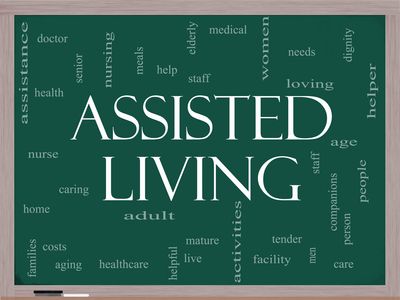When to Move from Assisted Living to Nursing Home?
Deciding when to move from assisted living to a nursing home can be challenging. Learn the key signs, including increasing care needs, medical complexity, and safety concerns, that may indicate it's time for a transition. Ensure your loved one receives the right level of care and support.

Introduction to Assisted Living, Nursing Care, and Skilled Nursing Care
Making the decision to move to an assisted living facility or nursing home can be daunting for both the individual and their family. It’s important that everyone involved understands the different types of care available and how they can help support the individual’s health and wellbeing. This guide provides an overview of assisted living, nursing homes, and long-term care options, as well as discussing the costs, services, and quality of care associated with each.
Assisted living is a type of residential facility that provides assistance with everyday activities such as bathing, dressing, managing medications or mobility assistance. An assisted living community offers a supportive environment for seniors, emphasizing opportunities for socialization and personalized care plans to maintain independence and well-being. Assisted living residents benefit from improved quality of life and the flexibility to transition to higher levels of care if needed. Nurses, doctors, social workers, and other staff are on site to provide medical care. Residents usually have access to communal areas and activities, and may be able to live independently within their own apartments.
A nursing home is generally more restrictive than an assisted living facility as it provides 24/7 nursing care. Residents typically receive more hands-on assistance with basic functions such as eating and moving around, as well as medical care. They usually live in private or semi-private rooms equipped with special features like call buttons for assistance.
Long-term care refers to the type of medical and social services provided to individuals who need round-the-clock care due to chronic illness or disability. It may be provided in the home or in a facility such as a nursing home. This type of care isn’t generally covered by insurance and can be quite costly.
By understanding the differences between these three types of care and exploring the various options available, you can make an informed decision when it comes to choosing the best care for your loved one.
Definitions: Assisted Living, Nursing Home and Long-Term Care
When choosing the best option for long-term care, it is important to understand the different kinds of care available. Let's start by defining assisted living, nursing home and long-term care.
- Assisted Living: These are residential housing facilities that offer personal assistance and supportive services for greater independence to individuals who may need help with activities of daily living.
- Nursing Home: These are residential facilities that provide 24-hour medical care and supervision for individuals who require a higher level of care than assisted living facilities.
- Long-Term Care: This is a broad term that refers to the kinds of health and personal care services needed by people who have chronic illnesses, disabilities or other conditions that require ongoing assistance. It can include assisted living, nursing homes, and even in-home care.
Understanding the difference between these types of care can provide the information necessary to make thoughtful, informed decisions about where to receive the best long-term care.
Pros and Cons of Assisted Living vs Nursing Home
Choosing the right place to live, or for a loved one, can be a challenging decision. Assisted Living and Nursing Homes are two of the most common long-term care options available for seniors, and while they may both seem like similar options there are some important differences that should be considered.
Pros of Assisted Living
- Residents have more independence and privacy in an assisted living facility compared to a nursing home.
- Assisted living facilities provide support and assistance with everyday activities such as bathing, dressing, meal preparation, and transportation.
- The cost of assisted living is often lower than the cost of nursing home care.
- Assisted living facilities typically offer more recreational activities and amenities than nursing homes.
Cons of Assisted Living
Assisted living is not a medical facility and does not provide the same level of healthcare that a nursing home does. If the resident’s needs become too complex, such as those with complex medical conditions, they may need to move to a nursing home. There may be fewer staff members per resident in an assisted living facility than in a nursing home. Assisted living facilities may not accept residents with severe memory impairments.
Pros of Nursing Homes
Nursing homes are staffed by healthcare professionals who can provide 24-hour care and medical services. These facilities are equipped with specialized medical equipment, similar to what is found in hospitals, to handle complex medical conditions and provide comprehensive patient care. Residents in a nursing home can receive physical, occupational and speech therapies. Nursing homes usually have specialized units for residents with Alzheimer’s or other memory impairments. The environment of a nursing home is designed to meet the unique needs of the residents.
Cons of Nursing Homes
- The cost of nursing home care is usually higher than in assisted living.
- Nursing homes have stricter rules and regulations that can take away from the resident's independence.
- In a nursing home, residents may not be able to socialize with people outside of the facility or participate in community activities as easily.
- Nursing homes may not accept residents with mild disabilities or those who don't require extensive medical care.
Timing: When to Move from Assisted Living to a Nursing Home
Deciding when to move from assisted living to a nursing home is an important life decision. It’s important to take time to consider the long-term implications and the benefits of each option, as well as your current individual needs.
Assisted living can generally provide for day-to-day needs such as meals, transportation, and other activities for a longer period of time than a nursing home. However, when health needs become more complex or physical needs increase, then a skilled nursing facility may be the best option. Skilled nursing facilities offer comprehensive medical care and specialized support for seniors requiring full-time medical attention. The following are factors to consider in determining when it’s time to move to a nursing home.
- The level of care you currently need
- The level of care you are likely to need in the future
- Quality of life
- Costs associated with each option
- Any changes in your living situation
- Location
- Family input
- Eligibility requirements
Skilled nursing services provided in these facilities include specialized medical treatments and therapies essential for residents needing advanced care.
It can be helpful to talk to a geriatric care manager or an elder law attorney for advice on timing. A care manager can assess the current health and emotional needs and make recommendations for the best option. An elder law attorney can discuss long-term planning strategies and options for financing both assisted living and nursing home care.
It’s important to think ahead and plan for the future. Taking the time to consider all your options today can ensure you get the care you need later in life.
Costs of Assisted Living and Nursing Home Care
The cost of care for various senior living options, including assisted living and nursing homes, can vary significantly, depending on many factors such as the services offered, location, and the type of facility. Assisted living, in general, is typically less expensive than a nursing home.
Assisted living facilities may offer either residential-style or congregate living. Residential-style facilities provide private spaces, including apartments and studios, with on-site services such as meals, laundry services, housekeeping, and medication management. Congregate living facilities offer shared common areas and amenities, such as libraries, fitness centers, spas, and computer labs, plus limited assistance with daily living activities. Room and board rates are sometimes lower in a congregate living facility.
Nursing homes offer more intensive medical and personal care than assisted living. Nursing homes are regulated by the state and must meet specific guidelines. They offer 24-hour professional medical care administered by licensed nurses, as well as meals, laundry services, housekeeping, and medication management. Costs at a nursing home are typically higher than an assisted living facility due to the level of service and care provided.
Other expenses associated with both assisted living and nursing homes may include an application fee, security deposits, and additional fees for special services. It is important to review all costs associated with each option before making a decision.
Services: Overview of Services Available in Assisted Living vs Nursing Home
When it comes to deciding between assisted living and nursing home care, an important consideration is the services available. It is essential to have a clear understanding of what type of services are offered in each so that you can determine the best option for your situation.
Assisted Living Services
Assisted living communities offer many services for residents. These services may vary from facility to facility, but generally include assistance with activities of daily living such as bathing, dressing, meal preparation, and medication management. Most assisted living facilities also provide social activities and transportation.
Nursing Home Services
Nursing homes provide a higher level of medical care than assisted living facilities. They offer 24-hour care and can provide short-term and long-term rehabilitative care for those recovering from illness or injury. Nursing homes also offer more comprehensive medical care including nursing and physician oversight, diagnosis, and treatment. In addition, most nursing homes offer more extensive recreational activities than assisted living facilities.
Comparing Services
When considering the services of assisted living and nursing homes it is important to compare and contrast the two. Assisted living facilities generally provide assistance with basic activities of daily living, while nursing homes offer a higher level of medical care. Additionally, nursing homes tend to offer more extensive recreational activities than assisted living facilities. Ultimately, it is important to assess the needs of the individual and determine which type of facility will be the best fit.
Quality of Care
When deciding whether to move from assisted living to a nursing home, it is important to consider the quality of care available in each. Quality of care is a key factor in determining which option is best for an individual's particular situation.
Assisted living facilities generally provide a wide range of services, including assistance with daily tasks, meals, transportation, medication management, and recreational activities. Staff members are usually available to help residents with whatever their needs may be. Quality of care at assisted living facilities varies greatly, as not all states have implemented standardized standards and regulations that these facilities must adhere to.
Nursing homes provide more comprehensive care than assisted living facilities. Each state has its own set of safety guidelines and regulations for nursing homes, so it is important to check what standards they must follow. Nursing homes typically offer 24-hour skilled nursing care, access to medical specialists, physical therapy, rehabilitation services, and other specialized care. Quality of care is often higher at nursing homes, as they are held to stricter standards than assisted living facilities.
When assessing the quality of care at an assisted living or nursing home, you should consider factors such as staff credentials, the availability of on-site medical professionals, the building's maintenance, and the staff's response to requests, complaints, and emergencies. Additionally, it is important to speak with current and former residents to get an honest impression of the quality of care.
Physical Needs
When considering transitioning from assisted living to a nursing home, physical needs are an important factor to consider. Assisted living facilities provide help with activities of daily living (ADLs), such as bathing, dressing, and eating, but nursing homes typically offer more comprehensive care. Nursing homes are staffed with Registered Nurses and Certified Nursing Assistants who can provide medical assistance and monitoring, and they offer 24/7 on-site medical care.
In an assisted living facility, you are generally able to remain in your own apartment or room. You may receive medication reminders, help with meals, and personal care if needed. However, if your needs become more complex, a nursing home may be a better option.
In a nursing home, you will typically have access to physical, occupational, and speech therapy. Your care team will continually assess your needs, provide assistance with ADLs, and give you appropriate medication. As your needs change, your care team will adapt accordingly. Nursing homes also offer social activities, support services, and a more nurturing environment.
Overall, it is important to consider your individual physical needs when deciding between assisted living and a nursing home. If you need more comprehensive care and personalized attention, a nursing home may be the better choice. Ultimately, your care team will be able to help you determine the best option for your situation.
Location
When considering assisted living or a nursing home, location is an important factor. Assisted living facilities are typically located in populated areas, while nursing homes may be located outside cities, in more rural areas. Consider proximity to family, the community, and nearby amenities such as shopping and entertainment when making a decision.
Assisted living facilities usually provide transportation services to nearby attractions and errands. Nursing homes may provide transportation to doctor's appointments and activities, but they are not usually as reliable as those offered at assisted living facilities.
It is also important to consider the accessibility of each option. Assisted living facilities are often designed with wheelchair accessibility in mind, while nursing homes may have certain limitations. Whether the option is ground-level or multi-story can make a big difference depending on the individual needs of the resident.
Finally, look carefully at the surrounding environment. Assisted living facilities typically have well-landscaped outdoor spaces and access to parks and other recreational venues. Nursing homes may have more limited outdoor areas, which can pose a challenge for someone who needs outdoor space to remain physically active.
In conclusion, exploring location is critical when deciding between assisted living and a nursing home. Factors like proximity to family and nearby amenities, transportation services, and the accessibility and environment of each option should be carefully weighed in order to make the most informed decision.
Family Involvement in the Decision
When considering the move from assisted living to a nursing home, family involvement is an important factor. The decision affects the entire family since it typically involves uprooting the resident from their home and community.
The family should always be a part of the decision-making process. It's not just the elderly person's decision, but also that of the family. It's important for the family to consider the emotional, physical and financial impact on the elderly person as well as the entire family.
There are many ways the family can get involved and support the elderly person during this transition. This may include helping to complete and submit paperwork, researching facilities, helping to review the terms of any facility's contract, or simply providing emotional support.
In addition to practical considerations, families should discuss the ethical implications of the move with the elderly person. Even if they are no longer able to make decisions for themselves, they still have the right to voice their opinions and wishes. It's important for the family to respect those wishes.
It's also essential for the family to ensure that the elderly person receives the best possible care in their new home. The family should visit the facility and talk to staff to ensure that the facility meets all their needs. Additionally, the family should periodically check in on the elderly person once they've moved to the nursing home.
Ultimately, the family plays a key role when it comes to deciding when to move from assisted living to a nursing home. The family must support the elderly person through the transition and ensure that the move is in their best interest.
Eligibility Requirements for Assisted Living and Nursing Care
When considering whether to move from assisted living to a nursing home, it's important to understand the eligibility requirements for both options. Generally, these requirements are different depending on the type of care you are seeking, though overlap may occur.
Assisted Living Requirements
Assisted living facilities typically require that an individual demonstrate independence in daily activities, such as bathing, grooming, dressing, and navigating the facility. Additionally, they usually require that individuals do not require skilled nursing care or continual supervision. However, some assisted living facilities are specifically designed for those with memory issues, such as Alzheimer's, and allow more intensive care.
Nursing Home Requirements
Nursing homes provide skilled nursing care and supervision around the clock. To be eligible for a nursing home, an individual must generally require assistance with activities of daily living (ADLs) and have a medical diagnosis that requires skilled nursing care. Eligibility for Medicaid-funded nursing home care may also require meeting specific financial criteria.
When considering whether to move from assisted living to a nursing home, it's important to understand these eligibility requirements for both types of care. It is essential to research the facilities and determine which one best meets the needs of the individual.
Conclusion
When deciding whether to move from assisted living to a nursing home, there is no one-size-fits-all solution. It's important to weigh up all the pros and cons before making a decision that is best for your individual needs.
The timing, costs, quality and services available in each option should be carefully considered and discussed with family members and healthcare professionals. It's also important to review your physical needs and think about the best location for you to live in.
Ultimately, the decision to move from assisted living to a nursing home should be based on what is best for you. Each option has its advantages, so consider all the factors carefully before making a decision.
It's important to remember that eligibility requirements for each option may vary, so it is advised that you contact your local healthcare provider to discuss your individual situation.
By understanding all the available options, weighing up the pros and cons, and following the advice of family members and healthcare professionals, you can make an informed decision about which option is best for you.
You might also like this article:

















